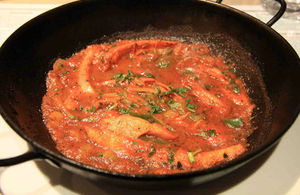Balti: world trademark bid
Birmingham city’s famous Balti dish is the first curry in Europe to apply for legally recognised status.

Birmingham Balti
Birmingham city’s famous Balti dish is the first curry in Europe to apply for legally recognised status meaning anyone in the world using the unique cooking method must refer to it as the Birmingham Balti.
The Protected Food Name scheme is designed to identify world class produce, boost local economies and protect regional heritage. Other British foods to achieve the status include Stilton and the Cornish pasty.
Protected Food Name Status helps grow our successful food and drink industry which remains our biggest manufacturing sector, greater than cars and aerospace combined. The entire food chain contributes £97 billion a year to our economy and employs one in eight people supporting our long-term economic plan.
Environment Secretary Elizabeth Truss said:
Curry is a great part of our food heritage along with fish and chips and pork pies.
Let’s hope the popular Birmingham Balti recipe follows in the footsteps of our other iconic foods like the Cornish pasty and Fenland celery. It would be a wonderful boost for this great city’s world famous Balti Triangle.
Legally protecting food names creates new jobs and attracts more tourists to the area. We hope other producers are encouraged to do the same and unlock the full potential that their original recipes can bring.
Andy Munro, adviser to the Birmingham Balti Restaurant Association said:
We are very grateful for the advice of Defra in helping overcome the initial hurdles and look forward to the day when it joins the hallowed ranks of Stilton Cheese and Arbroath Smokies as a protected food.
This week is the 17th National Curry Week, celebrating this delicious dish. Originally developed by Birmingham’s large Mirpuri community, the popular ‘Birmingham Balti’ was adopted by restaurants across the country.
Its five distinctive characteristics are:
- The meat is cooked off the bone rather than on the bone
- Fast cooked in a in a thin pressed steel ‘wok’, commonly known as the ‘Balti’ and cooked at high temperatures over a high flame very quickly.
- Vegetable oil is used instead of ghee.
- Dried spices are used, added during the fast cooking process, with the exception of the fresh ginger and garlic puree.
- It is served in the Balti, in which it is cooked and traditionally eaten with the fingers using naan bread.
Further information
- List of Protected Food Names
- Information on how to register for Protected Food Name status
- Information on National Curry Week
- For more information from Defra please contact 020 7238 6027
Photo credit: Anna Gibson photography